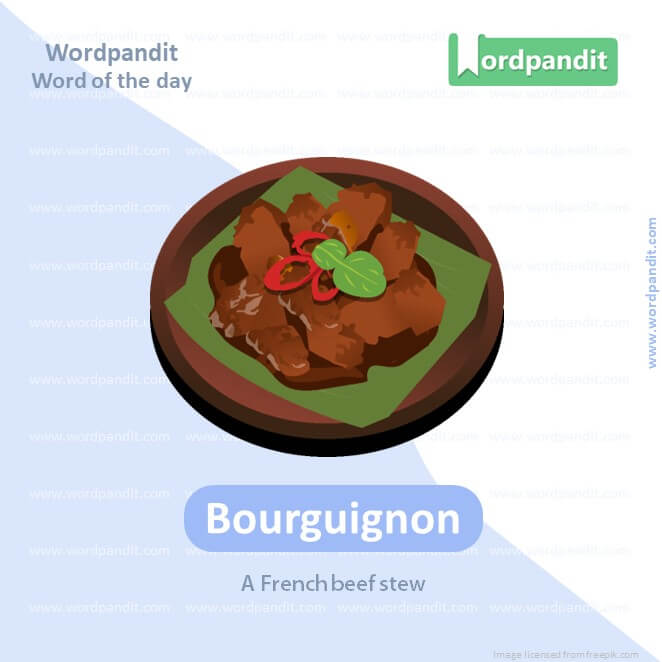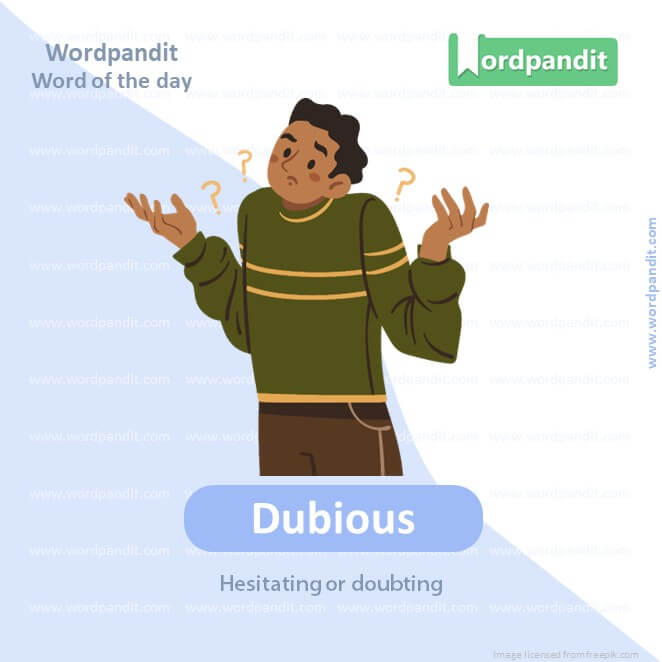Daily Vocabulary Words: List of Daily Used Words in Leading International Newspapers
Hi there. Welcome to this special section @ Wordpandit.
Our endeavour here is very simple: to highlight important daily vocabulary words, which you would come across in leading newspapers in the country. We have included the following newspapers in our selection:
• The New York Times
• The Washington Post
• Scientific American
• BBC
• The Guardian
• Psychology Today
• Wall Street Journal
• The Economist
We are putting in extensive work for developing your vocabulary. All you have got to do is be regular with this section and check out this post on a daily basis. This is your repository of words that are commonly used and essentially, we are posting a list of daily used words. Hence, this has significant practical application as it teaches you words that are used commonly in leading publications mentioned above.
Visit the website daily to learn words from leading international newspapers.

WORD-1: Bourguignon
CONTEXT: Renowned chefs are exploring the roots of classic dishes, such as the Bourguignon, to bring traditional flavors to modern gastronomy.
SOURCE: The New York Times
EXPLANATORY PARAGRAPH: Imagine a yummy stew made with beef, red wine, onions, and some mushrooms. It’s like a special French soup, and it’s called Bourguignon!
MEANING: A French beef stew (noun)
PRONUNCIATION: borgheeNYOHN
SYNONYMS: Beef Burgundy, beef stew, pot roast, meat stew, beef and wine stew, casserole, ragout
USAGE EXAMPLES:
1. For dinner, mom made a delicious pot of Bourguignon.
2. The chef’s Bourguignon was the best in town.
3. I tasted Bourguignon for the first time at the French restaurant.
4. Julia recommended pairing the Bourguignon with mashed potatoes.

WORD-2: Dubious
CONTEXT: Many experts are casting a dubious eye on the recent statistics published, questioning their accuracy and the methodology used.
SOURCE: The Washington Post
EXPLANATORY PARAGRAPH: If you’re not sure about something or think it’s a bit strange, you can say it’s dubious.
MEANING: Hesitating or doubting (adjective)
PRONUNCIATION: DOObeeus
SYNONYMS: doubtful, uncertain, unsure, skeptical, suspicious
USAGE EXAMPLES:
1. I’m dubious about eating that green cake.
2. The teacher was dubious of Tim’s excuse for being late.
3. That salesman seems dubious; I don’t trust him.
4. The story he told was so wild, it sounded dubious to everyone.

WORD-3: Efficacy
CONTEXT: The latest trials have shown the efficacy of the new drug, promising a potential breakthrough in the treatment of the disease.
SOURCE: Scientific American
EXPLANATORY PARAGRAPH: Think of efficacy as a superpower. It’s like how good or strong something works. If medicine has high efficacy, it means it works really well!
MEANING: The ability to produce a desired or intended result. (noun)
PRONUNCIATION: EFFikahsee
SYNONYMS: effectiveness, potency, power, efficiency, usefulness
USAGE EXAMPLES:
1. The efficacy of the new medicine surprised doctors.
2. We tested the efficacy of the cleaning solution.
3. I doubt the efficacy of this old remedy.
4. The study focused on the efficacy of the educational program.

WORD-4: Reverie
CONTEXT: In the heart of London, the quiet gardens become a space for city dwellers to escape into a momentary reverie amidst nature.
SOURCE: The Guardian
EXPLANATORY PARAGRAPH: Reverie is like a daydream. Imagine floating on a cloud and thinking happy thoughts; that’s being in a reverie.
MEANING: A state of being pleasantly lost in one’s thoughts; a daydream (noun)
PRONUNCIATION: REVuhree
SYNONYMS: daydream, dream, musing, trance, fantasy
USAGE EXAMPLES:
1. He was snapped out of his reverie by the loud noise.
2. The beautiful music sent her into a deep reverie.
3. Sitting by the window, she drifted into a peaceful reverie.
4. During his morning walks, he often fell into a reverie.

WORD-5: Shaolin monk
CONTEXT: Documentaries this year shed light on the disciplined life of a Shaolin monk, their rigorous training, and the philosophy they live by.
SOURCE: BBC
EXPLANATORY PARAGRAPH: Shaolin monks are like super cool, wise people from China who do awesome martial arts and meditate for peace.
MEANING: A member of a Buddhist monastic order that practices martial arts (noun)
PRONUNCIATION: SHAOlin monk
SYNONYMS: monk, martial artist, Buddhist monk, warrior monk, kung fu monk
USAGE EXAMPLES:
1. The Shaolin monk performed amazing martial arts moves.
2. I learned about the life of a Shaolin monk during my trip to China.
3. The movie was about a young boy becoming a Shaolin monk.
4. Shaolin monks are known for their discipline and strength.
WORD-6: Venerable
CONTEXT: The venerable institution has seen more than a century of history, yet its walls echo with modern debates and ideas.
SOURCE: The Economist
EXPLANATORY PARAGRAPH: Venerable is a word we use for someone or something that’s very old and respected. It’s like calling your wise old grandpa “venerable” because he’s lived a long time and knows a lot!
MEANING: Deserving respect because of age, wisdom, or character. (adjective)
PRONUNCIATION: VENeruhbul
SYNONYMS: respected, esteemed, honored, revered, distinguished
USAGE EXAMPLES:
1. The venerable oak tree has been in the town square for centuries.
2. The community sought advice from the venerable elder.
3. The museum housed venerable artifacts from ancient civilizations.
4. He is considered a venerable figure in the world of literature.
WORD-7: Hallucinating
CONTEXT: Recent studies have indicated that certain species of plants have compounds that can lead to humans hallucinating when consumed or inhaled.
SOURCE: Al Jazeera
EXPLANATORY PARAGRAPH: Imagine seeing a unicorn in your room, but when you try to touch it, it’s not really there. That’s like hallucinating. Sometimes people see or hear things that aren’t there.
MEANING: Experiencing a perception of something that is not really present. (verb)
PRONUNCIATION: huhLOOsinateing
SYNONYMS: imagining, daydreaming, seeing things, fantasizing, envisioning
USAGE EXAMPLES:
1. After not sleeping for days, she started hallucinating.
2. The medicine’s side effects made him feel like he was hallucinating.
3. “Are you seeing those floating stars or am I hallucinating?” she asked.
4. He was hallucinating due to the high fever.
WORD-8: Swathes
CONTEXT: Swathes of the Amazon rainforest continue to be at risk as illegal logging activities persist, causing concern among environmentalists.
SOURCE: The Economist
EXPLANATORY PARAGRAPH: Swathes are like big blankets or patches. Imagine a big field with different colored flowers making patches; each patch is like a swathe.
MEANING: Broad strips or areas of something. (noun)
PRONUNCIATION: swaythz
SYNONYMS: stretches, expanses, strips, tracts, bands
USAGE EXAMPLES:
1. Swathes of land were covered in golden wheat.
2. The artist painted swathes of blue across the canvas.
3. The countryside was a patchwork of green swathes and brown fields.
4. Swathes of clouds drifted across the sky.
WORD-9: Nostalgia
CONTEXT: As technology surges forward, there’s a wave of nostalgia sweeping through generations who remember a world without screens.
SOURCE: The Guardian
EXPLANATORY PARAGRAPH: Nostalgia is like a warm, fuzzy feeling you get when you remember a fun time from the past, like your last birthday party or a fun trip you took.
MEANING: A sentimental longing for the past. (noun)
PRONUNCIATION: noSTALgeeuh
SYNONYMS: reminiscence, wistfulness, sentimentality, yearning, longing
USAGE EXAMPLES:
1. Watching old cartoons gave him a sense of nostalgia.
2. The song filled her with nostalgia for her teenage years.
3. There’s a certain nostalgia in flipping through old photo albums.
4. The smell of rain brought on an unexpected wave of nostalgia.
WORD-10: Tinderbox
CONTEXT: The political situation in the region remains a tinderbox, with even minor events having the potential to ignite major confrontations.
SOURCE: BBC
EXPLANATORY PARAGRAPH: Think of a tinderbox like a box full of super dry stuff that can catch fire easily. But sometimes, people also use it to describe a place where things can get heated or explode, like a big argument waiting to happen.
MEANING: A container holding materials for creating a fire easily. (noun) / A place or situation that can quickly become dangerous or difficult. (noun)
PRONUNCIATION: TINderbox
SYNONYMS: firestarter, powder keg, flashpoint, catalyst, spark
USAGE EXAMPLES:
1. He kept a tinderbox handy for camping trips.
2. With all the tension, the city was a political tinderbox.
3. The dried forest acted as a tinderbox during the hot summer months.
4. The debate became a tinderbox of emotions and opinions.
Vocabulary Grammar
The journey of language mastery is a thrilling blend of words and structure, often referred to as ‘vocabulary grammar’. These critical components of any language work hand in hand to facilitate meaningful communication. However, embracing ‘vocabulary grammar’ requires a nuanced understanding and a strategic learning approach.
The initial step towards understanding ‘vocabulary grammar’ is to study the functionality of words in a sentence. Grammar holds the key to how vocabulary is structured in language. Therefore, observe how words change or influence meaning when placed differently in a sentence.
Leveraging diverse resources is a great way to grasp ‘vocabulary grammar’. Engage with a range of reading materials, audio-visual resources, and interactive language apps. This offers genuine exposure to ‘vocabulary grammar’ in real-world contexts and enhances comprehensive learning.
While learning ‘vocabulary grammar’, it’s important to see vocabulary and grammar as interconnected. Understanding how different parts of speech function can help in the effective usage of vocabulary. Try creating your own sentences using new vocabulary following certain grammatical rules to reinforce learning.
Revision holds its due significance in mastering ‘vocabulary grammar’. Regular review of learnt grammar rules and vocabulary ensures long-term retention and bolsters understanding. Use techniques like spaced repetition to make your review sessions more effective.
Lastly, practicing ‘vocabulary grammar’ is key to cementing your knowledge. Whether it is through writing exercises or conversing in the language, practicing allows you to apply ‘vocabulary grammar’ in a practical context and aids in accurate language use.
In conclusion, understanding ‘vocabulary grammar’ calls for conscious observation, diversified resources, interconnected learning, regular revision, and relentless practice. As you navigate this path, you will see ‘vocabulary grammar’ like two sides of the same coin, both essential to the value it holds in the wealth of language learning.









